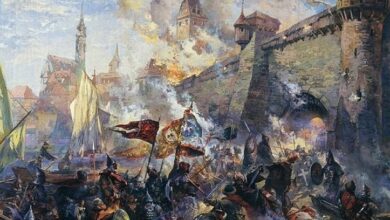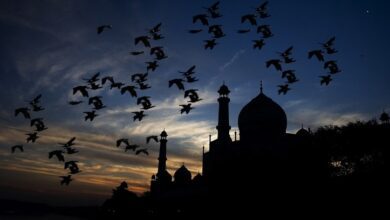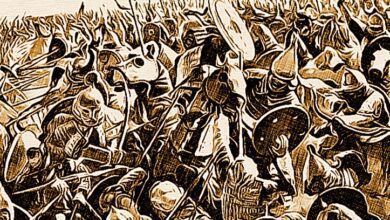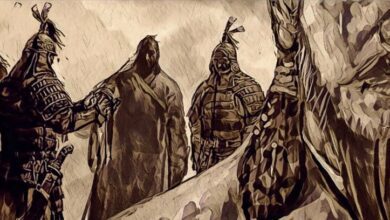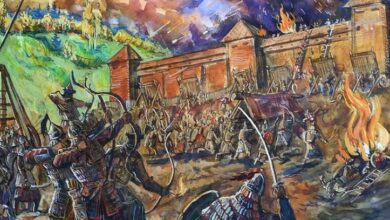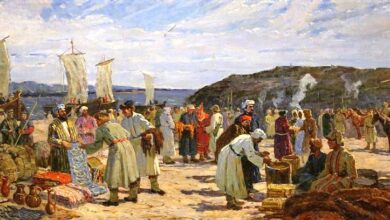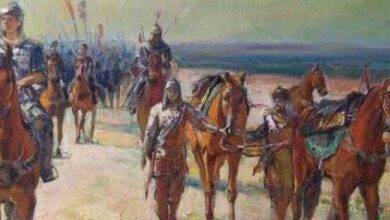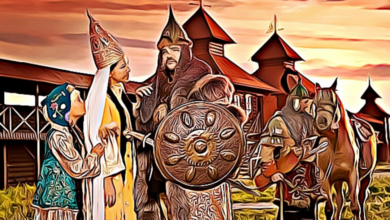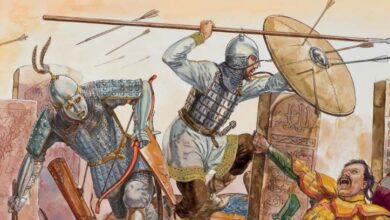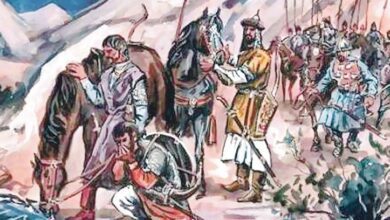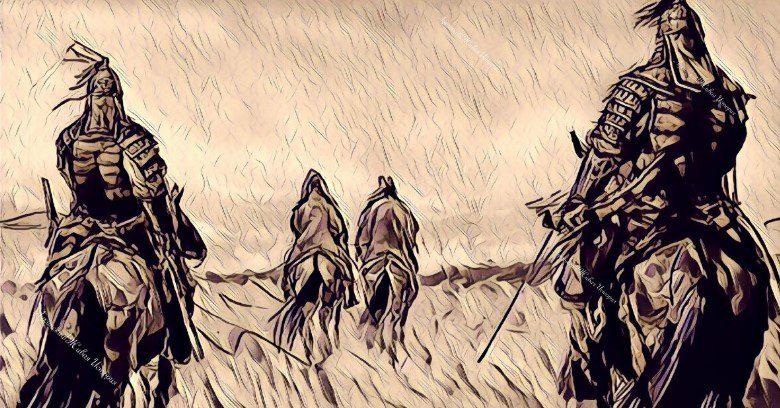
Bu-Yurgan kitabs. Chapter 9
ToWhen the rebels approached Kazan, they were joined by the Simbirsk Ulugbek Chura -. son of Mal-Naryk. Ulugbek liked to ensure peace for the three war-tired western ils of Bulgar. Chura's support decided the matter in favor of the emir... Gali, whose younger wife was Chura's sister, heeded the call of the matchmaker "not to shed their own blood" and led the Cheremshans out of the city. Following this, the ordinary people of Kazan, who hated Safa for trying to leave the baliks to their fate, as well as the Kara-Chirmysh builders, exhausted by work, were outraged by the Tazikbash and rushed to Shakhri Gazan. Under the cover of shooting from the Kazan kazanchis and murzas who entered the inner quarters, the poor broke through the wall of Shakhri Gazan and broke into the fortress. Several dozen Crimeans of the khan tried to hold back the onslaught of the crowd at the Yugara Kerman wall, which was walking along the Tazik ditch, but the rebels broke this wall and killed the yuldash. The remains of this stone wall were thrown into the Tazik ditch and never rebuilt. Ak-Balyk, the son of Amat, barely managed to take Shakhri Gazan’s valuables, the khan himself and his relatives on 12 ships across the pier at the Mir-Gali gate along the Kazan-su Kama-Tamak channel ... Fazyl suggested that Safa wait out the rebellion in Cheremshan at the post of Bulyar tamgachy, but he preferred to take time off from service and leave for the Crimea together with the Crimean embassy. The seid instructed the Cheremshan sardar Gali to accompany the khan, who was saved from punishment for leaving Kazan only by the transfer of all his Cossacks to the service of the emir ...
. Three hundred dzhigits of Gali did not allow the Simbirsk outpost of Saratau to capture Safa and safely handed it over to a detachment from the Crimea that arrived at the balik ...
The loss of all the Cheremshan Cossacks and the danger of betrayal of the rest did not allow the seid to immediately put an end to the rebellion ... The triumphant emir Mamet entered Kazan and soon, on the advice of Chura, concluded a very favorable peace with Moscow. Weakened and frightened by the defeat near Kazan, Balynets handed over the western part of Modjar to the Kazan il, and the Mukhshan regions of Kisan to the Simbir il, and in addition pledged to support the emir by force
three thousandth Russian corps of the voivode Vasyl bine Petryach. The Emir appointed the younger brother of Shah-Gali, who served Moscow, Dzhan-Gali, to the post of Kazan ulugbek, so that the Moscow ulug-biy could, if anything, justify his shameful concessions to Bulgar in the eyes of the Uruses, shameful for Balyn. Also, in order to deceive his subjects, Balynets asked Mamet for permission to keep Russian garrisons in Seber-Kale and Lachyk-Ub and did not announce the transfer of lands to anyone. The son of Agish Mamysh-Birde told me that when his brother Ikhsan and bek Kadysh approached a Russian monastery beyond Batlik, his monks did not believe the news that their district had passed under the authority of the emir and refused to pay tribute. Ihsan drove off, and Kadysh surrounded the monastery and kept it under siege until he ran out of supplies. After that, he also went to rest in Kukdzhak, leaving only guards at the monastery, and soon learned about the end of this monastery. Having not received any help for a long time, the monks finally realized that they had been left to the mercy of fate and, as soon as Kadysh left, they drowned all the good in the nearby lake and fled ...
Dzhan-Gali, warned by his shrewd and intriguing brother about the danger of governorship in Kazan without the permission of the Seid-Emir of Challyn, refused to go to Bulgar and was taken to the border with the State in chains. Here he was received by the people of Mamet and taken to Kazan ...
When Kul-Ashraf finally returned to the State and removed Fazyl from power, he had to start all over again ...
In 1533, the emir ordered Dzhan-Gali to marry the daughter of the Nogai Ulubi Yusuf Syuyunbike. With this, Mamet wanted to attract the strongest old Nogai leader to his side and with his help defeat Yadkar. In the same year, 13-year-old Syuyunbiku was brought to Kazan ...
Seyid, however, quickly found allies in the fight against Yusuf - his younger brother Ismail and the Astrakhan Khan Yadkar-Mohammed, to whom he granted his name during his trip to Astarkhan in 1525 ... In the same year, a split occurred between the Ar and Kazan Kaz.anchis , caused by the removal of the Kazan Archans from enrichment at the expense of the newly annexed lands, In terrible anger, the Arsk uhlans began to call Kazan traitor Kazanchis and Murz “Betle Tatars”. And this word "Tatar" in the world at first was used to call all the criminals whom the Genghisides forced to fight ahead of their soldiers as a punishment ... One of the Genghisides - the unfaithful Hulagu - gathered his army almost from one of these scum and led them to war against the countries of Islam. He destroyed thousands of flourishing cities of Khorezm, Khorasan, Azerbaijan, Rum and Sham, along with their countless inhabitants, and gave all the devastated Muslim regions to Christians and yahuds dear to his heart ...
275
274
The ghazis of Sultan Misr did not allow his dirty Tatar army to reach the holy cities of Islam - Mecca and Medina, and then, in hatred for Muslims, he fell upon the capital of the faithful of the whole world - Baghdad. The great city with its two million inhabitants was destroyed, and the emir of the Muslims - the caliph - was brutally murdered by the Tatars. Since then, the very word "Tatar" has become hated by all Muslims and has acquired, in addition to other vile meanings, the meaning of "infidel", "sinner", "damned". Sheikh Kasim, therefore, did not let a single Kipchak into the mosque, telling them: “You Kipchaks are all Tatars cursed by the Almighty, destroyers and haters of the Islamic world, so you have nothing to do in the mosque and hope in vain for the mercy of Allah.” And our yuldashi from the Crimea, Astarkhan, Azak, Seber, Kyrgyz and Nogaev, in order not to lose hope of salvation ... called themselves "besermen", that is, "Bulgars" ...
But our people were able not only to give well-aimed nicknames, but also to handle weapons. Therefore, as expected, the matter did not end with words alone. There was a skirmish between the son of Shekhid-Ulan Shamai, who stood for the emir, and the son of Ismaildan Yanchura, when the emir tried to subdue the Arsky il. Yanchura utterly defeated the attacker and turned him into a stampede, and after him the governor of the emir with his Kazan lancers rushed to flee from Echke-Kazan ...
The son of Djurash-Sadir, Arak, swore not to let Kazan Kazanchies go further than Biektau, and Ihsan and Mamysh-Birde cut off the path from Alat to Batlik. The Emir, having learned about this, was greatly alarmed and himself appeared in Echke-Kazan to settle the squabble. At the cost of yielding to the Archans of Batlik, he managed to prevent the local Kazanchis from going over to the side of Yadkar, but Yanchura could no longer calm down. He managed to organize a conspiracy in the Arsk il with the aim of returning the Kazan il under the power of the seid - on the condition that Yadkar again put Safa as Ulugbek and respect the rights of the Arsk il. Yadkar willingly accepted the conditions of the conspirators and in 1535, when they were prepared, he invited Safa-Garay to his service. On this signal, Ismaildan approached Echke-Kazan and, with the help of Ulugbek Arak, forced the emir to call Dzhan-Gali to him for an account. The unfortunate khan went, but at Echke-Kazan he was captured by Yanchura and immediately hanged. Following this, the Arsk Kazanchis rapidly went to Kazan, sweeping away everything in their path, and burst into the city on the move. The Cheremshan Cossacks, who did not receive the promised land, as well as the poor, joined the Archans and, together with them, began to mercilessly beat everyone who looked like Tatars. They say that only in Kazan 1200 Murzas, 500 Kazan Kazanchi Djurs and 300 Khan-Kerman Yulda-shey were killed. Mamet's rebellion was suppressed, and he himself was captured and sent by Yanchura to the Ar Ulugbek Arak. The Russian alay, which was stationed in the Kara-Muslim balik, did not take part in this battle, although, just in case, it fortified itself in one of the urams. And when the voivode Vasyl wanted to force his people to oppose the Ar army, the Balyn warriors tied him up and, after negotiations with Yanchura, handed him over to the bek in exchange for his life and freedom of choice. Most of the Russians converted to Islam and were settled on the Misha River as subashes, 900 people decided to remain in their faith and received the rights of the Kara-Chirmysh and land along Nukrat-su, and only a hundred Balyns wanted to return to Moscow. But they failed to accomplish this, because the troops of the infidels treacherously invaded Batlik, Mo-dzhar, Mukhsha and Uchkuy and started a cruel war against Bulgar...
276

